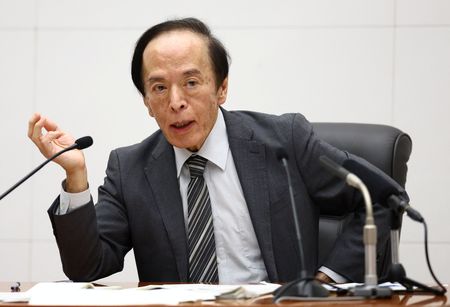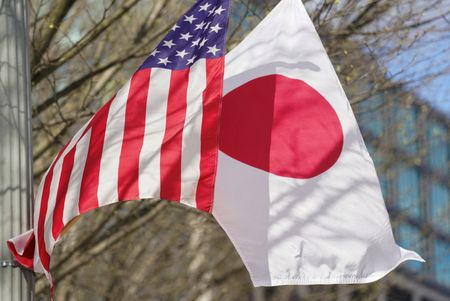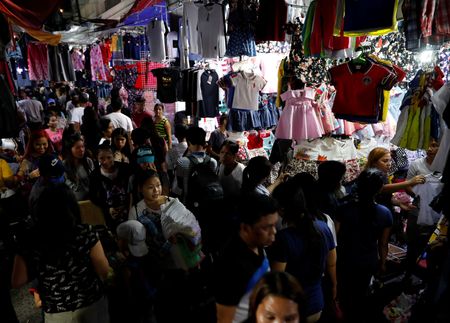By Satoshi Sugiyama
TOKYO (Reuters) -Japanese real wages turned positive for the first time in seven months in July on the back of hefty summertime bonuses, while consumer spending rose for the third straight month, data showed on Friday.
Although the July headline figures were upbeat, government officials and analysts said elevated inflation put pressure on consumption, complicating the Bank of Japan’s (BOJ) decision on how soon to resume interest rate hikes.
Inflation-adjusted real wages, a key determinant of households’ purchasing power, edged up 0.5% in July from a year earlier, the first increase since December last year when they inched up by 0.3%. Special payments, including the bonuses, jumped 7.9%, labour ministry data showed.
The consumer inflation rate the ministry uses to calculate real wages, which includes fresh food prices but not rent costs, rose 3.6% year-on-year in July.
While it rose at the slowest pace since November last year, it far exceeds the Japanese central bank’s 2% inflation target.
“The impact of the summer bonus increase was significant, and there is insufficient momentum for real wages to remain in positive territory without the boost from special payments,” said Masato Koike, senior economist at Sompo Institute Plus.
“It would be premature to conclude that this result increases the likelihood of the BOJ raising interest rates,” he said.
Regular pay, or base salary, grew 2.5% in July, the fastest rise in seven months. Overtime pay, a barometer of strength in corporate activity, rose 3.3%, the highest since November 2022.
Total cash earnings, or nominal pay, increased 4.1% to 419,668 yen ($2,848.49) in July, the fastest growth in seven months.
Major Japanese firms on average agreed to pay hikes of more than 5% during annual spring wage talks this year.
BOJ Governor Kazuo Ueda said last month that wage hikes were spreading beyond large firms and likely to keep accelerating due to a tightening job market, but there are lingering worries that the U.S. tariffs would cause a global economic slowdown and squeeze corporate profits.
Meanwhile, separate internal affairs ministry data showed Japan’s household spending in July rose 1.4% from a year earlier, short of the median market forecast for a 2.3% rise.
On a seasonally adjusted, month-on-month basis, spending increased 1.7%, versus an estimated 1.3% rise.
A ministry official said the increase is due to a rise in electricity bills and automobile expenses, but added spending on everyday food items remains subdued due to inflation.
“The recovery in consumer spending is not robust,” the official said.
($1 = 147.3300 yen)
(Reporting by Satoshi Sugiyama; Editing by Muralikumar Anantharaman)











